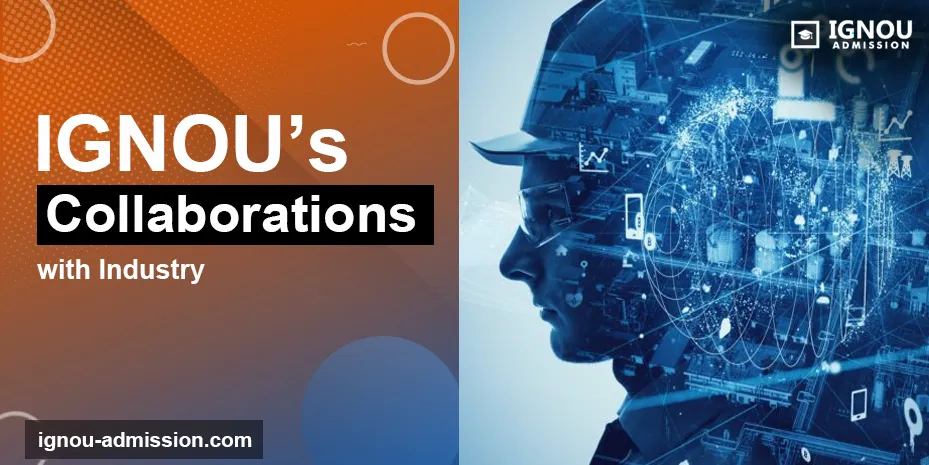In today’s rapidly evolving job market, the gap between education and industry is a growing concern for students and employers alike. With the ever-changing economy and technological advancements, universities are facing the challenge of preparing students for jobs that don’t yet exist. This is where IGNOU’s industry collaborations come in. IGNOU has established collaborations with various industries in order to bridge the gap between education and industry. These collaborations have been created to ensure that students receive the relevant skills and knowledge they need to succeed in the workforce. In this post, we’ll explore IGNOU’s industry collaborations, how they work, and why they are so important for students.
Contents
- 1 1.Introduction to IGNOU’s industry collaborations
- 1.1 2. The importance of bridging the gap between education and industry
- 1.2 3. Benefits of industry collaborations for students
- 1.3 4. How IGNOU is fostering industry collaborations
- 1.4 5. Successful industry collaborations by IGNOU
- 1.5 6. Impact of industry collaborations on student employability
- 1.6 7. How industry collaborations enhance curriculum and learning outcomes
- 1.7 8. Challenges and solutions in implementing industry collaborations
- 1.8 9. Future prospects and recommendations for further industry collaborations
1.Introduction to IGNOU’s industry collaborations
IGNOU, also known as the Indira Gandhi National Open University, has been at the forefront of distance education in India for several decades. With its commitment to providing quality education to a diverse range of students, IGNOU has not only focused on academic excellence but also on bridging the gap between education and industry. One of the ways IGNOU achieves this is through its strategic industry collaborations.
IGNOU’s industry collaborations are partnerships established with leading organisations and companies across various sectors. These collaborations aim to enhance the learning experience of IGNOU students by providing them with practical exposure and real-world insights. By bringing together academia and industry, IGNOU ensures that its programs are relevant, up-to-date, and aligned with the needs of the job market.
Through these collaborations, students have the opportunity to gain valuable industry knowledge, develop essential skills, and establish professional networks. They may participate in internships, apprenticeships, or industry-specific projects that allow them to apply theoretical concepts in practical settings. This hands-on experience not only adds value to their resumes but also equips them with the skills and confidence needed to excel in their chosen fields.
Furthermore, IGNOU’s industry collaborations benefit not only the students but also the partnering organisations. By engaging with IGNOU, companies gain access to a pool of talented and motivated individuals who bring fresh perspectives and innovative ideas. They can tap into this talent pool for recruitment purposes, thereby addressing their workforce needs effectively.
2. The importance of bridging the gap between education and industry
Bridging the gap between education and industry is of paramount importance in today’s fast-paced and ever-evolving world. As the demands and requirements of the job market change, it becomes crucial for educational institutions to align their programs with the needs of the industry. This is where collaborations between universities like IGNOU and various industries play a vital role.
Traditionally, there has been a disconnect between academia and the professional world. Many graduates find themselves ill-prepared to tackle the challenges of the workplace, lacking the necessary skills and practical knowledge. On the other hand, industries often struggle to find candidates who possess the right skill set and are ready to hit the ground running.
By forging partnerships with industries, institutions like IGNOU can bridge this gap and ensure that their students are equipped with the skills and knowledge that are in demand in the job market. These collaborations offer a multitude of benefits. Firstly, they provide students with real-world exposure and practical experience through internships, workshops, and industry visits. This hands-on experience enables them to develop the skills that employers look for – problem-solving, critical thinking, teamwork, and effective communication.
Furthermore, industry collaborations also facilitate curriculum development. By involving industry experts in the process, educational institutions can stay up to date with the latest trends and technologies. This ensures that the courses offered are relevant and aligned with the needs of the industry. It also allows for the inclusion of industry-specific case studies and projects, making the learning experience more practical and engaging.
In addition to benefiting students, bridging the gap between education and industry also helps industries themselves. Collaborations with educational institutions like IGNOU offer industries the opportunity to tap into a pool of talented and well-trained individuals. This not only solves the problem of finding skilled employees but also fosters innovation and brings fresh perspectives to the table.
3. Benefits of industry collaborations for students
Industry collaborations can bring numerous benefits for students enrolled in IGNOU. These collaborations provide students with opportunities to gain practical knowledge and skills that are highly valued in the professional world. By working closely with industry professionals, students can bridge the gap between theoretical learning and real-life application.
One of the key benefits of industry collaborations is the exposure it offers to the latest industry trends and practices. Through workshops, seminars, and internships facilitated by the collaborating industries, students can stay updated on the evolving demands and requirements of the respective fields. This exposure not only enhances their knowledge but also helps them develop a competitive edge in the job market.
Another advantage of industry collaborations is the chance to network with professionals and experts in the field. Students can interact with industry leaders, attend guest lectures, and participate in industry events. This networking opportunity allows them to establish valuable connections, gain insights from experienced professionals, and potentially open doors to internships or job opportunities.
Furthermore, industry collaborations often involve project-based learning, where students can work on real-life projects and contribute to solving industry challenges. This hands-on experience allows them to develop problem-solving skills, critical thinking abilities, and teamwork. It also helps students understand the practical implications of their academic studies and prepares them for the demands of their future careers.
4. How IGNOU is fostering industry collaborations
IGNOU, also known as the Indira Gandhi National Open University, has been at the forefront of bridging the gap between education and industry through its strategic collaborations with various industries. Recognizing the importance of practical exposure and real-world experience, IGNOU has taken proactive steps to ensure that its students are well-equipped to thrive in the professional world.
One of the ways IGNOU fosters industry collaborations is by establishing partnerships with leading companies across different sectors. These collaborations allow IGNOU to align its curriculum with the industry’s evolving needs and trends. By working closely with industry experts, IGNOU can identify the skills and knowledge that are in high demand and incorporate them into its programs. This ensures that students receive a holistic education that is relevant and up-to-date.
Furthermore, IGNOU offers industry-specific courses and programs that are designed in collaboration with industry professionals. These programs are tailored to provide students with specialised knowledge and practical skills that are directly applicable to their chosen fields. By working hand-in-hand with industry partners, IGNOU ensures that its students are prepared to meet the specific challenges and requirements of their respective industries.
Additionally, IGNOU facilitates internships, apprenticeships, and on-the-job training opportunities for its students through its industry collaborations. This allows students to gain valuable hands-on experience and develop a deeper understanding of the industry they are interested in. By connecting students with industry mentors and professionals, IGNOU encourages networking and facilitates career opportunities for its students.
5. Successful industry collaborations by IGNOU
IGNOU, known for its innovative approach to education, has successfully forged numerous industry collaborations that have bridged the gap between education and industry. These collaborations have not only enhanced the learning experience for students but have also provided them with valuable industry exposure and opportunities.
One noteworthy industry collaboration by IGNOU is with the National Skill Development Corporation (NSDC). Through this collaboration, IGNOU has been able to offer skill-based certificate programs in various sectors such as healthcare, retail, hospitality, and more. These programs are designed in collaboration with industry experts and provide students with practical skills that are in high demand in the job market.
Another successful collaboration by IGNOU is with leading multinational companies. By partnering with industry giants, IGNOU is able to offer specialised courses in fields such as information technology, finance, marketing, and human resources. These courses are designed to align with the latest industry trends and equip students with the knowledge and skills required to excel in their chosen field.
Additionally, IGNOU has collaborated with renowned research institutions and organisations to promote research and innovation. Through these collaborations, IGNOU students have the opportunity to work on cutting-edge research projects and contribute to advancements in various fields. This not only enhances their learning experience but also prepares them for future careers in research and development.
6. Impact of industry collaborations on student employability
The impact of industry collaborations on student employability cannot be overstated. When universities like IGNOU collaborate with industries, it opens up a plethora of opportunities for students to gain practical experience and develop skills that are highly sought after in the job market.
Firstly, these collaborations provide students with exposure to real-world scenarios and challenges. By working on industry projects, students get hands-on experience in their field of study, which goes beyond theoretical knowledge gained in classrooms. This practical experience gives them a competitive edge when applying for jobs, as employers value candidates who can hit the ground running and apply their skills effectively.
Industry collaborations also provide students with networking opportunities. Through internships, workshops, seminars, and guest lectures, students can interact with professionals from various industries. This enables them to build connections, gain insights into the industry trends, and understand the expectations and requirements of potential employers. These connections can prove invaluable when it comes to securing internships, job placements, and even mentorship opportunities.
Moreover, industry collaborations often lead to the development of specialised programs and courses tailored to meet the industry’s demands. This ensures that students are equipped with the specific skills and knowledge required by employers. By aligning the curriculum with industry standards, students graduate with a skill set that is relevant and up-to-date, increasing their employability and reducing the skill gap between academia and industry.
Additionally, industry collaborations can pave the way for internships and job placements for students. Many collaborations involve partnerships that offer internships or apprenticeships to students, giving them a chance to gain practical experience within the industry. This exposure not only enhances their employability but also provides them with an opportunity to showcase their skills and potentially secure employment within the collaborating industry.
7. How industry collaborations enhance curriculum and learning outcomes
Industry collaborations play a crucial role in enhancing the curriculum and improving learning outcomes in educational institutions like IGNOU. By partnering with industry experts and organisations, IGNOU ensures that its curriculum remains relevant and up-to-date with the latest industry trends and requirements.
One of the key benefits of these collaborations is the opportunity for students to gain practical knowledge and real-world experience. Industry experts often contribute to the development of course content, ensuring that it aligns with the needs and demands of the industry. This involvement brings a fresh perspective to the curriculum, incorporating the latest tools, technologies, and practices being used in the industry.
Through these collaborations, IGNOU is able to offer its students access to industry-specific resources, such as guest lectures, workshops, internships, and industry visits. These experiences provide students with invaluable insights into the practical applications of their studies, allowing them to bridge the gap between theory and practice.
Furthermore, industry collaborations also open doors for networking and career opportunities for IGNOU students. By working closely with industry partners, students have the chance to connect with professionals, build relationships, and explore potential job prospects. This exposure to the industry can significantly enhance their employability and help them make informed career choices.
8. Challenges and solutions in implementing industry collaborations
Implementing industry collaborations in the education sector comes with its fair share of challenges. One of the main hurdles is finding the right balance between the academic curriculum and the needs of the industry. Educational institutions like IGNOU must ensure that the collaborations align with the core values and objectives of the institution while also meeting the demands of the industry.
Another challenge is establishing effective communication and coordination between the academia and industry partners. Both sides may have different working styles, priorities, and expectations. It requires open and transparent communication channels, regular meetings, and mutual understanding to bridge the gap and work towards a common goal.
Resource allocation and financial constraints can also pose challenges. Industry collaborations often require additional resources, such as infrastructure, technology, and expertise. Educational institutions like IGNOU need to carefully manage their resources to support these collaborations without compromising the quality of education.
To overcome these challenges, certain solutions can be implemented. First and foremost, a strong framework should be developed to guide the implementation of industry collaborations. This framework should clearly define the objectives, roles, and responsibilities of all stakeholders involved.
Regular feedback mechanisms should be established to assess the effectiveness of the collaborations. This can help identify areas of improvement and address any issues that may arise during the implementation process. Flexibility and adaptability are key in ensuring that the collaborations evolve and stay relevant in a rapidly changing industry landscape.
9. Future prospects and recommendations for further industry collaborations
The future prospects for industry collaborations with IGNOU are incredibly promising. As technology continues to advance and industries evolve at a rapid pace, there is a growing need for educational institutions to adapt and provide students with the skills and knowledge required by the industry. By fostering more industry collaborations, IGNOU can ensure that its students are equipped with the latest industry-relevant skills and are prepared to excel in their chosen fields.
One recommendation for further industry collaborations is to establish more internship and apprenticeship programs. These programs provide students with valuable hands-on experience and allow them to apply their theoretical knowledge in real-world settings. Collaborating with industry partners to offer such programs can bridge the gap between education and industry, giving students a competitive edge in the job market.
Additionally, IGNOU can collaborate with industry experts to develop specialised courses and certifications that address emerging trends and demands in various sectors. By staying current with industry developments and tailoring its curriculum accordingly, IGNOU can ensure that its graduates possess the skills and expertise that employers are seeking.
Furthermore, fostering research partnerships with industry leaders can lead to innovative solutions and advancements in various fields. Collaborative research projects can not only benefit students and faculty members but also contribute to the growth and development of industries.
It is also recommended that IGNOU actively seeks feedback from industry partners and stakeholders to continuously improve its programs and offerings. By maintaining open lines of communication, IGNOU can better understand the evolving needs of the industry and make necessary adjustments to its curriculum and teaching methodologies.




